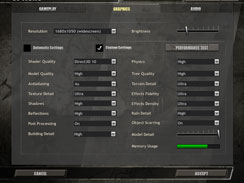First Look: Nvidia 3-way SLI on nForce 680i
December 13, 2007 | 14:01

Company of Heroes: Opposing Fronts
Publisher: THQWe used the full retail version of Company of Heroes: Opposing Fronts patched to version 2.1.0.3. It's the expansion pack for one of the best real-time strategy games of all time. Not only is the gameplay incredibly good and immersive, the graphics engine is simply stunning, making extensive use of post processing and advanced lighting techniques in the fully destructible environment.
The original game was updated to version 1.7.0 in June, and that patch brought DirectX 10 capabilities to the game's engine. We've compared the various DirectX 10 cards using the game's DirectX 10 mode and Opposing Fronts expands on the original's DirectX 10 features.
For our testing, we used the in-built demo to gauge performance, which is very similar to the original rolling demo, but with some new effects. In this rolling demo, there is heavy use of water, lighting, explosions and also masses of vegetation and it represents fairly typical performance throughout the game.
The in-game details were set to their maximum values, with anti-aliasing controlled from inside the game - we've included a screenshot of the settings used below. Anisotropic filtering was forced from the driver control panel in all cases.
We haven’t tested Company of Heroes: Opposing Fronts under DirectX 9.0 mode, because the game isn’t anywhere near as intensive and there is arguably no benefit to owning two GPUs, never mind three if you’re playing the game without the extra DX10 effects and shaders turned on.
At 1920x1200 with either 0xAA or 4xAA enabled, you will see scaling, but it’s the same scenario as BioShock, in that the benefits are a higher frame rate than one that’s already above 50-to-60 frames per second. The same is true at 2560x1600 0xAA – the big kick comes when you move from one GPU to two GPUs, and 3-way SLI adds another 30 percent more frames over two cards. That’s not a bad increase, but it’s at frame rates where you will find it hard to notice the difference in performance.
Once you move to 2560x1600 with 4xAA applied, the benefits were quite clear, as you’d now moved from an unplayable 24 frames per second with a single card to around 43 frames per second with SLI and then to almost 60 frames per second with 3-way SLI. These are the kind of settings you’re going to need to be running in order to see advantages to 3-way SLI and it helps to explain why when I said that you need deep pockets if you’re going to invest in this kind of platform, I meant it.

MSI MPG Velox 100R Chassis Review
October 14 2021 | 15:04









Want to comment? Please log in.